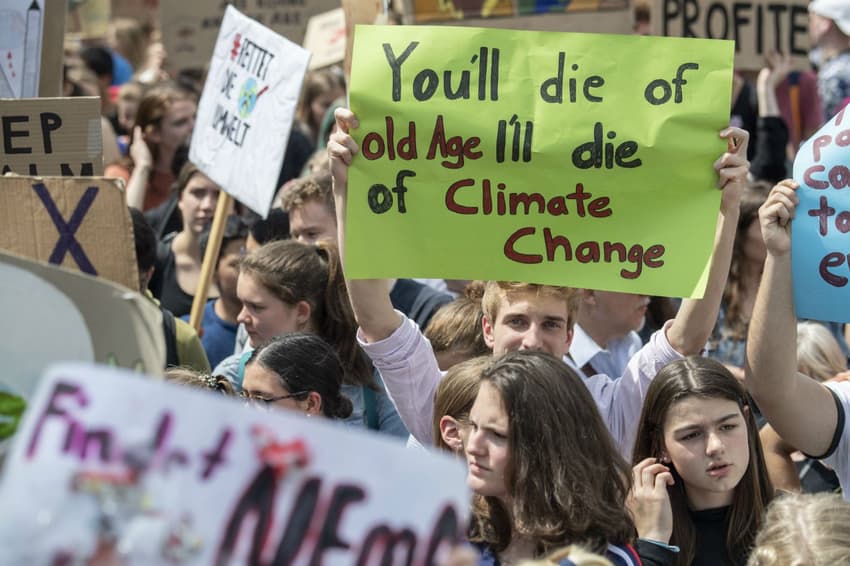Germany pledges €100 billion in the fight against climate change

German Chancellor Angela Merkel's coalition government plans to commit at least €100 billion on climate protection by 2030, according to a draft policy paper being discussed on Thursday.
Merkel's conservatives and the centre-left Social Democrats were expected to haggle late into the night on the details before the landmark policy package was due to be announced Friday.
The EU's biggest economy is set to miss its climate targets for next year but has committed itself to meeting the 2030 goal of a 55 percent cut in greenhouse gas emissions from 1990 levels.
Export powerhouse Germany accounts for around two percent of the worldwide emissions blamed for heating the Earth's atmosphere, melting ice caps, rising sea levels and intensifying violent weather events.
After two blistering summers and a wave of Fridays For Future student strikes and other environmental protests, the Merkel government has faced rising pressure to step up its efforts to protect the climate.
READ ALSO: Six things to know about the upcoming climate strikes in Germany
The coalition now looks to commit to spending "in the triple digit billions", or at least €100 billion, according to the nearly 140-page draft paper titled "Climate Protection Programme 2030" seen by AFP.
The document states that "the additional investments in climate-friendly measures will support the economy" and help future-proof Germany as a business, trade and investment location.
Germany wants to implement "a variety of effective and ambitious measures to reduce greenhouse gas emissions" and help "preserve the foundation for life on Earth", the draft paper said.
How will Germany tackle climate change?
Measures listed would tackle emissions in the energy and industrial sectors as well as in housing, transport, agriculture, waste management and the state apparatus itself.
The government aims to step up subsidies for the purchase of zero-emission electric vehicles and expand the country's still under-developed electric car charging infrastructure.
It would also raise tax incentives for making buildings more energy efficient and promote alternative fuels, local public transport and climate-friendly freight transport.
READ ALSO: Protests against German car industry draw 25,000
The two coalition parties are currently unresolved on how to better price harmful carbon emissions from oil, gas and coal into economic activity in order to incentivize clean alternatives.
While Merkel's party wants to expand the trading of emission certificates, the Social Democrats have called for a carbon tax.
Merkel's government will announce its plan on the day expected to see the biggest international wave of climate strikes yet by the Fridays for Future movement and the hundreds of civic groups that support it.
Comments
See Also
Merkel's conservatives and the centre-left Social Democrats were expected to haggle late into the night on the details before the landmark policy package was due to be announced Friday.
The EU's biggest economy is set to miss its climate targets for next year but has committed itself to meeting the 2030 goal of a 55 percent cut in greenhouse gas emissions from 1990 levels.
Export powerhouse Germany accounts for around two percent of the worldwide emissions blamed for heating the Earth's atmosphere, melting ice caps, rising sea levels and intensifying violent weather events.
After two blistering summers and a wave of Fridays For Future student strikes and other environmental protests, the Merkel government has faced rising pressure to step up its efforts to protect the climate.
READ ALSO: Six things to know about the upcoming climate strikes in Germany
The coalition now looks to commit to spending "in the triple digit billions", or at least €100 billion, according to the nearly 140-page draft paper titled "Climate Protection Programme 2030" seen by AFP.
The document states that "the additional investments in climate-friendly measures will support the economy" and help future-proof Germany as a business, trade and investment location.
Germany wants to implement "a variety of effective and ambitious measures to reduce greenhouse gas emissions" and help "preserve the foundation for life on Earth", the draft paper said.
How will Germany tackle climate change?
Measures listed would tackle emissions in the energy and industrial sectors as well as in housing, transport, agriculture, waste management and the state apparatus itself.
The government aims to step up subsidies for the purchase of zero-emission electric vehicles and expand the country's still under-developed electric car charging infrastructure.
It would also raise tax incentives for making buildings more energy efficient and promote alternative fuels, local public transport and climate-friendly freight transport.
READ ALSO: Protests against German car industry draw 25,000
The two coalition parties are currently unresolved on how to better price harmful carbon emissions from oil, gas and coal into economic activity in order to incentivize clean alternatives.
While Merkel's party wants to expand the trading of emission certificates, the Social Democrats have called for a carbon tax.
Merkel's government will announce its plan on the day expected to see the biggest international wave of climate strikes yet by the Fridays for Future movement and the hundreds of civic groups that support it.
Join the conversation in our comments section below. Share your own views and experience and if you have a question or suggestion for our journalists then email us at [email protected].
Please keep comments civil, constructive and on topic – and make sure to read our terms of use before getting involved.
Please log in here to leave a comment.